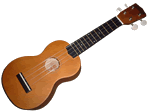
Yesterday I bought myself a ukulele, something I’ve been thinking about doing for a while. I already play the guitar and mandolin, and had been thinking about trying other stringed instruments, such as the ukulele, banjo and bouzouki. A while ago I saw a poster about the Bangor Uke Club / Clwb Uke Bangor and thought it might be cool to join it, and yesterday I finally did.
The usual story is that the word ukulele (/juːkəˈleɪliː/) comes from the Hawaiʻian words ʻuku /Ɂuku/ – louse, flea; small, tiny, and lele /lele/ – to fly, jump, leap, hop, skip, swing, bounce, and many other meanings.
The OED describes the ukulele as “a small four-stringed Hawaiʻian guitar that is a development of a Portuguese instrument introduced to the island c1879”, and the Online Etymology Dictionary says that the name ukulele or ‘leaping flea’ comes from the rapid movement of the fingers used to play it.

According to the ‘Ukulele Guild of Hawai’i, ‘ukuleles developed from a type of small guitar known as machete do braga or braguinha (see right) from Madeira. They also mention that there is some uncertainity about the origins of the name ukulele – one story is that a certain Edward Purvis, an English solider who was assistant chamberlain to the Hawaiʻian King Kalākaua in the 1880s, and who was a small man with a lively playing style on this instrument, was nicknamed ‘ukulele (dancing flea) by the Hawaiʻians, who gave the same name to the instrument.
The earliest written reference to this instrument, in a travel book about Hawai‘i, dates back to 1891 and it was spelt ukelele rather than ukulele, a word which didn’t appear in print until 1895 in the Hawaiʻian Gazette. Both spellings were used interchangeably for a period, and the former possibly comes from the Hawaiʻian word ʻukē – to swing, sway; tap, rap, tick, thud.
The Ukulele Orchestra of Great Britain mention a number of possible origins of the word ukulele: a certain João Fernandes from Madeira was nicknamed ‘ukulele (dancing flea) by the Hawai‘ians, who were impressed by his virtuosity and speed on the braguinha, and the way his fingers jumped about, and the name became associated with the instrument as well. Alternatively it was Edward Purvis who acquired the nickname. Or that the name comes from uku (a tribute, reward, fee) and lele (to land, disembark); or from ʻūkēkē lele (‘dancing ʻūkēkē’ – a type of musical bow); or that Gabriel Davian and Judge W. L. Wilcox coined and translated the name, joking that the way one scratched at it, the instrument must have been a jumping flea.
Other Hawaiʻian expressions featuring lele include:
– lele māmā – to fly swiftly, dart
– hoʻo.lele – to cause to fly; to fly, as a kite; to disembark, to embark, as on a project; to palpitate; to enlarge or project, as pictures
– hoʻolele leo – radio broadcast, broadcaster, microphone, ventriloquism, ventriloquist
– hoʻolele hua kēpau -to set type
– mea hoʻolele leo – microphone
Fascinating, I didn’t even know the Ukulele was Hawaiian in origin.
I was looking around the web for how the word ukulele has been naturalised in other languages and it seems that most languages retain its spelling the same we have in English. Welsh forms of ukulele are ‘iwcalili’ or ‘iwceleli’ (plurals with -s) so it could be ‘Clwb Iwcalili Bangor’? Don’t know about ‘uke’, though – ‘iwc’?
Irish Gaelic has – ucailéile and Latin ‘cithara Havaiana’ according to the Latin wikipedia page.
If you google the Irish ucailéile you don’t get many hits but google suggests searching for ‘ucalalie’ which seems as if people have been spelling ukulele phonetically on various sites?